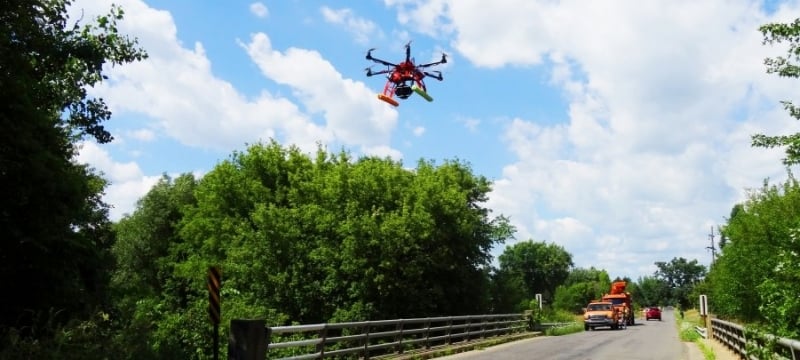Online Education for Working Professionals
Prepare for the mapping use of unmanned aerial systems (UAS).

Meet the industry demand for skills in the exploration of geospatial data.
Gain applied geospatial science and technology skills, including sensors and their calibration methods. Learn digital photogrammetry and photogrammetric computer vision. Engage in UAS flight planning and Earth Observation Systems (EOS) imagery photogrammetric processing. Formulate digital representations of 2D products and 3D models. Expand your career in geospatial engineering and integrated geospatial technology, civil engineering, forestry, geosciences, computational sciences, and computer engineering. Be prepared for the professional certifications as ASPRS Mapping Scientists or UAS Scientists. Photogrammetry jobs pay an average of $82,860 per year (U.S. Bureau of Labor Statistics).
-
Figures from U.S. Bureau of Labor Statistics (BLS), dated May 2024.
3 courses in 3 semesters.
| Department | Civil, Environmental, and Geospatial Engineering |
|---|---|
| Admissions requirement | BS degree |
| Contact | Angela Keranen |
| Length | 3 courses in 2-3 semesters |
|---|---|
| Effort | 3 hours per credit per week |
| Each course | 3 credits |
| Total credits | 9 |
| Course type | Online or on-campus |
| Modality | Watch class recordings on demand |
| Cost | Based on credits and course type |
| Already enrolled? | Speak with your advisor |
Curriculum
Progress quickly with a compact curriculum. Work with the program advisor to select courses that fit your interests and pre-requisite skills.
Required Courses
Take 6 credits of required courses.
Electives
Take a 3-credit elective course.
Typical Schedule
The minimum completion time is one semester.
| Fall | Spring |
|---|---|
| SU 4140 | SU 5540 SU 5541 |
Application Process and Admissions Requirements
Applications are reviewed on an individual basis using a holistic approach. Fill out our free graduate application online to apply to any of our programs. Official transcripts and scores are not required for the initial application, although you will need to upload them later.
Interested in taking a single, online course? Enroll as a non-degree seeking student.
Upon completion of the Certificate the student should be able to:
- Solve photogrammetric engineering problems, and apply their solution to real world application scenarios.
- Process photogrammetrically UAS and satellite imagery to extract positionally accurate geospatial information.
Michigan Tech was founded in 1885.
The University is accredited by the Higher Learning Commission and widely respected by fast-paced industries, including automotive development, infrastructure, manufacturing, and aerospace. Michigan Tech graduates deliver on rapid innovation and front-line research, leaning into any challenge with confidence.
The College of Engineering fosters excellence in education and research.
We set out as the Michigan Mining School in 1885 to train mining engineers to better operate copper mines. Today, more than 60 percent of Michigan Tech students are enrolled in our 17 undergraduate and 29 graduate engineering programs across nine departments. Our students and curriculum embrace the spirit of hard work and fortitude our founders once had. Our online graduate courses are the same, robust classes taken by our doctorate and masters candidates, taught directly by highly regarded faculty, with outstanding support from staff. We invite working professionals to join these courses, bring their own experience and challenges as part of the discussion. Leverage the national reputation of Michigan Tech to advance your career in tech leadership.
Online Certified Instructors
Meet the online certified instructors. Students have the flexibility to review class recordings later.

Jeffery Hollingsworth
Professor of Practice, Civil, Environmental, and Geospatial Engineering
Teaching Statement
Mr. Hollingsworth has most recently taught courses in (1) Geospatial Monitoring of Engineering Structures and Geodynamic Processes and (2) Surveying Computations and Adjustments.

Eugene Levin, CP
Adjunct Associate Professor, Civil, Environmental, and Geospatial Engineering
Teaching Statement
Dr. Levin's teaching interests include Earth observation systems, geodesy, photogrammetry, geospatial technologies, global positioning systems, remote sensing, cartography, and much more.